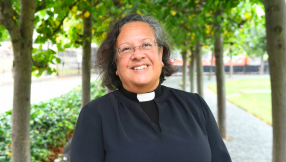
Africans have had a profound impact on the story of Christianity. Long before the Gospel reached Europe, it had already taken hold in North Africa — shaping the theology, practice, and moral foundation of the global Church. Indeed, many of the faith’s most influential early thinkers and saints were people of African and it is right that their legacies are remembered and honoured.
So, here are three remarkable figures from the African continent whose faith, intellect and courage who helped shape Christianity as we know it today.
Tertullian of Carthage (c. 155–240 AD)
Known as the “Father of Latin Christianity,” Tertullian was a North African scholar from Carthage (modern-day Tunisia), one of the ancient world’s great intellectual and spiritual centres. A lawyer by training and a passionate defender of the faith, he was the first major theologian to write Christian works in Latin — helping translate the Gospel into the language of the Roman world.
Shaped by Carthage’s strong intellectual and moral culture, he brought the precision of a lawyer and the boldness of an African moralist into his theology. His writings reflected a society that valued discipline, justice, and courage in the face of persecution, giving his arguments a fiery conviction and clarity.
He also coined the term “Trinity” (Trinitas in Latin) to describe the Father, Son, and Holy Spirit — a concept that remains central to Christian doctrine today. Tertullian’s sharp intellect and fearless apologetics helped Christians defend their beliefs in a hostile pagan culture.
Though later controversies surrounded his strict moral views, his theological and linguistic legacy cemented him as a cornerstone of early Christian thought — a Black African whose pen helped define the faith.
St Augustine of Hippo (354–430 AD)
Perhaps the most famous of them is Augustine of Hippo, from a town in what is now North Africa, once part of the Roman province of Numidia (modern-day Algeria). Though Hippo is now a place of little significance, its name lives on through one of the most influential thinkers in Christian history.
Born to a Christian mother, St. Monica, and a Berber father, Augustine’s background reflected both the indigenous and Latin influences of North Africa. He was gifted intellectually and received a strong education in Carthage, where he trained in rhetoric and philosophy. Before his conversion, Augustine was drawn to Manichaeism, a belief system that described the world as a conflict between light and darkness. He later left North Africa for Italy, where, in Milan, he encountered the preaching of St. Ambrose and through his mother’s prayers experienced a profound conversion to Christianity.
In 396, Augustine became bishop of Hippo, and it was during this time that he produced some of the most enduring works of Christian thought. His Confessions — written years after his conversion — remains one of the most honest and powerful testimonies of repentance ever written, recounting his restless search for truth, his mother’s faith, and God’s relentless grace. His later work, The City of God, offered hope and theological depth in a world shaken by the fall of Rome.
Augustine’s writings addressed many challenges facing the Church of his time. He opposed Donatism, a movement that questioned the validity of clergy who had faltered under persecution, and Pelagianism, which denied the necessity of divine grace. For Augustine, human nature was deeply marked by sin, and only God’s grace could redeem and transform it.
He also wrote profoundly on the Trinity, describing God as love itself — a perfect relationship between Father, Son, and Holy Spirit. For Augustine, this divine communion revealed that human beings, made in God’s image, are created for relationship, love, and community.
Though often remembered through a European lens, Augustine was unmistakably North African. His culture and context deeply shaped his faith and thought — a faith marked by reason, moral integrity, and resilience amid social and political turmoil. His influence endures across denominations, shaping both Catholic and Protestant theology, and reminding the Church that God’s grace remains the only sure foundation in a collapsing world.
St Moses the Black (330–405 AD)
Perhaps the most dramatic story of all, St. Moses the Black - once a gang leader and thief in Egypt - lived a life of violence before encountering Christ in a desert monastery. There, he was radically transformed. His life became a living testimony to redemption, humility, and grace — proof that no one is beyond the reach of God’s mercy.
As a monk and later a priest, Moses became known for his deep humility and compassion. When accused of sin, he famously carried a leaking sack of sand on his back to symbolize his own faults, saying, “My sins run out behind me, and I do not see them, and yet I come to judge my brother.”
Eventually, Moses was martyred during a raid, refusing to take up arms against his attackers. His life continues to inspire believers to this day to embrace forgiveness, humility, and transformation.
A Legacy to Remember
From the philosophical brilliance of Augustine and Tertullian to the radical grace of Moses the Black, these African Christians remind us that the Church’s roots are beautifully diverse. Their stories are not side notes — they are the foundation stones of the faith we share. Let’s celebrate their witness — a reminder that Christianity has always been global, inclusive, and enriched by the Holy Spirit’s gifts to Africa.













